- Clone
- QA17A04 (See other available formats)
- Regulatory Status
- RUO
- Other Names
- HNK-1, NK-1, Leu-7, B3GAT1
- Isotype
- Mouse IgG1, κ
- Ave. Rating
- Submit a Review
- Product Citations
- publications

-

Human peripheral blood lymphocytes were stained with anti-human CD8 (clone RPA-T8) FITC and anti-human CD57 recombinant (clone QA17A04) Spark PLUS UV395™ (left) or mouse IgG1, κ Spark PLUS UV395™ isotype control (right). -

Human peripheral blood lymphocytes were stained with anti-human CD56 (clone HCD56) APC and anti-human CD57 recombinant (clone QA17A04) Spark PLUS UV395™ (left) or mouse IgG1, κ Spark PLUS UV395™ isotype control (right).
| Cat # | Size | Price | Quantity Check Availability | Save | ||
|---|---|---|---|---|---|---|
| 393335 | 25 tests | 200€ | ||||
CD57, also known as HNK-1, NK-1, and Leu-7 is a 100-115 kD oligosaccharide antigenic determinant expressed on a variety of proteins, lipids, and chondroitin sulfate proteoglycans. CD57 is expressed on a subset of peripheral blood lymphocytes, including NK cells and CD8+ T cells, and is also expressed on neural cells and striated muscle. CD57 is not expressed on red blood cells, granulocytes, monocytes, or platelets. While the function of CD57 is unknown, binding to L-selectin, P-selectin, and a fragment of laminin suggests that CD57 may be involved in cell-matrix interactions. CD57 is increased in some disease states associated with CD4/CD8 imbalances (AIDS, autoimmune disease, viral infections, and allograft transplants).
Product DetailsProduct Details
- Verified Reactivity
- Human
- Antibody Type
- Recombinant
- Host Species
- Mouse
- Immunogen
- Membrane extract of human lymphoblastoid cell line HSB-2.
- Formulation
- Phosphate-buffered solution, pH 7.2, containing 0.09% sodium azide and BSA (origin USA)
- Preparation
- The antibody was purified by affinity chromatography and conjugated with Spark PLUS UV395™ under optimal conditions.
- Concentration
- Lot-specific (to obtain lot-specific concentration and expiration, please enter the lot number in our Certificate of Analysis online tool.)
- Storage & Handling
- The antibody solution should be stored undiluted between 2°C and 8°C, and protected from prolonged exposure to light. Do not freeze.
- Application
-
FC - Quality tested
- Recommended Usage
-
Each lot of this antibody is quality control tested by immunofluorescent staining with flow cytometric analysis. For flow cytometric staining, the suggested use of this reagent is 5 µL per million cells in 100 µL staining volume or 5 µL per 100 µL of whole blood. It is recommended that the reagent be titrated for optimal performance for each application.
* Spark PLUS UV395™ has a maximum excitation of 355 nm and a maximum emission of 385 nm. - Excitation Laser
-
Ultraviolet Laser (355 nm)
- RRID
-
AB_3106117 (BioLegend Cat. No. 393335)
Antigen Details
- Structure
- Oligosaccharide antigenic determinant present on a variety of proteins, lipds, and chrondroitin sulfate proteoglycans, 100-115 kD. The antigen is convserved across species.
- Distribution
-
NK cells, subset of CD8+ T cells, neural cells, striated muscle
- Ligand/Receptor
- Binds to L-selectin and P-selectin in a calcium-dependent manner, also binds to second globular domain of E8 laminin fragment.
- Cell Type
- NK cells, T cells
- Biology Area
- Cell Adhesion, Cell Biology, Costimulatory Molecules, Immunology
- Molecular Family
- CD Molecules
- Antigen References
-
- Schubert J, et al. 1989. In Leucocyte Typing IV (Knapp W, ed) Oxford University Press Oxford pp 711-714.
- Palmer BE, et al. 2005. J. Immunol. 175:8415.
- Schachner M, et al. 1995. Trends Neurosci. 18:183.
- Wood KL, et al. 2005. Clin. Immunol. 117:294.
- Gene ID
- 27087 View all products for this Gene ID
- UniProt
- View information about CD57 on UniProt.org
Related FAQs
Other Formats
View All CD57 Reagents Request Custom ConjugationCompare Data Across All Formats
This data display is provided for general comparisons between formats.
Your actual data may vary due to variations in samples, target cells, instruments and their settings, staining conditions, and other factors.
If you need assistance with selecting the best format contact our expert technical support team.
-
Purified anti-human CD57 Recombinant Antibody
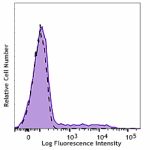
Human peripheral blood lymphocytes were stained with purifed... 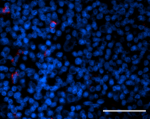
IHC staining using purified anti-CD57 antibody (clone QA17A0... -
Brilliant Violet 605™ anti-human CD57 Recombinant Antibody

Human peripheral blood lymphocytes were stained with CD56 AP... -
APC anti-human CD57 Recombinant Antibody

Human peripheral blood lymphocytes were stained with CD56 PE... -
Brilliant Violet 510™ anti-human CD57 Recombinant Antibody
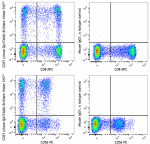
Human peripheral blood lymphocytes were stained with CD8 APC... -
PerCP/Cyanine5.5 anti-human CD57 Recombinant Antibody
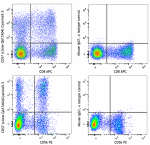
Human peripheral blood lymphocytes were stained with CD8 APC... -
PE anti-human CD57 Recombinant Antibody
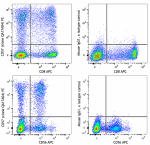
Human peripheral blood lymphocytes were stained with CD8 APC... -
PE/Cyanine7 anti-human CD57 Recombinant Antibody
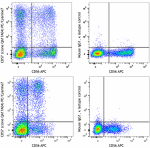
Human TruStain FcX™ (Cat. No. 422302) treated human peripher... -
PE/Dazzle™ 594 anti-human CD57 Recombinant Antibody

Human peripheral blood lymphocytes were stained with True-St... 
Human peripheral blood lymphocytes were stained with True-St... -
TotalSeq™-C0168 anti-human CD57 Recombinant Antibody
-
TotalSeq™-A0168 anti-human CD57 Recombinant Antibody
-
TotalSeq™-B0168 anti-human CD57 Recombinant Antibody
-
Brilliant Violet 785™ anti-human CD57 Recombinant Antibody

Human peripheral blood lymphocytes were stained with CD56 AP... 
Human peripheral blood lymphocytes were stained with CD8 Ale... -
Brilliant Violet 421™ anti-human CD57 Recombinant Antibody

Human peripheral blood lymphocytes were stained with CD8 Ale... 
Human peripheral blood lymphocytes were stained with CD56 AP... -
Brilliant Violet 711™ anti-human CD57 Recombinant Antibody

Human peripheral blood lymphocytes were stained with CD56 AP... 
Human peripheral blood lymphocytes were stained with CD8 Ale... -
TotalSeq™-D0168 anti-human CD57 Recombinant Antibody
-
Spark PLUS UV395™ anti-human CD57 Recombinant Antibody

Human peripheral blood lymphocytes were stained with anti-hu... 
Human peripheral blood lymphocytes were stained with anti-hu... -
PerCP/Fire™ 780 anti-human CD57 Recombinant Antibody

Human peripheral blood lymphocytes were stained with anti-hu...

 Login / Register
Login / Register 













Follow Us